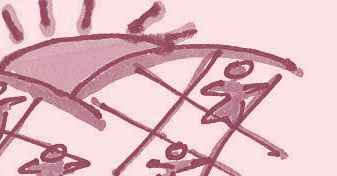Addressing Decolonization
Core concepts from decolonization literature allows us to find common ground in understanding the sources of oppression and a path toward liberation. We cover three thematic areas:
1. Understanding Oppression: the positive aspects of our histories and identities, as well as the negative ways we have internalized the difficult aspects as a result of the marginal place indigenous people have historically occupied in the structures of power in our countries of origin.
2. Understanding Power Structures: this discussion centers around understanding the historical legacy of racism and prejudice against indigenous people and how this is manifested in lack of economic and political opportunities both in our countries of origin and here in our present communities.
3. Paths Toward Liberation: here we discuss the importance of developing a prophetic imagination to allow us to visualize the transformation of the world we want to achieve. How can we live our lives not as passive victims of oppression without becoming the oppressors or reproducing injustice in our struggles?
I. INTRODUCTION TO BASIC CONCEPTS
1. Colonization vs. Decolonization
2. Oppression vs. Empowerment
3. Racism vs. Prejudice
4. Equality vs. Difference
5. Racial Justice
6. Political Project of Liberation (how not to live our lives not as victims,
but without becoming the oppressors)
Activity: Discuss how we can translate these concepts into our languages and our experiences so that our community members can understand them.
II. GENDER & COMMUNITIES OF COLOR
1. Patriarchy vs. Feminism
2. Oppression vs. Privilege
3. Gender Identity
Activity: Discuss the following questions in small groups and then report back in plenary format.
1. Do men and women experience discrimination in the same
way in our communities back home? In the communities
where we live now?
2. what ways does migration change women?
In what ways do things remain the same?
3. What do we hope the future looks like for ourselves, our daughters?
III. MIGRANTS OR REFUGEES
1. What are we? (this is an opportunity to share experiences of migration)
2. Who decides who are migrants and who are refugees?
How does that impact peoples’ lives?
3. What are the economic and social consequences of our migratory status?
4. Reasons behind implementing policies such as the Muslim Ban.
Activity: Participants will gather in small groups and answer the above questions in a easel papers so all the group can look at the answers. Base on the answers find commonalities and difference. Finally, the group try to envision a joint future and the politics of coalition building. Discuss the question in the closing section in small groups, then report back in plenary format.


Principles
• Popular education is a consciousness- building process that uses key goals to learn and realize cultural and social context and see what can be changed

Tips
• Be mindful of who is in the room and their readiness to discuss these topics
• We recommend that each of these areas be discussed in one workshop
• Decolonizing is a process; it doesn’t happen in one workshop

References
• The Theory Behind Our Work booklet
• Popular Education section tools
